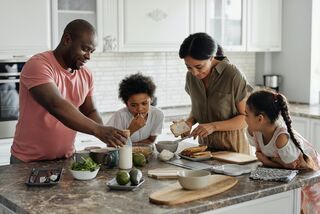
In the early, uncertain days of the first COVID-19 lockdowns, there was a lot of news coverage that suggested that the pandemic was going to have a long-lasting negative impact on families. Early reports from China, where the first lockdowns had been imposed, anticipated that divorce rates were likely to skyrocket. Similar trends quickly emerged in other countries as their initial lockdowns were lifted, including in the United Kingdom.
However, these initial projections have not manifested as feared. Rather, with the initial shock of the pandemic subsiding, a more positive picture of relationships in lockdown is emerging, even if life hasn't fully returned to prepandemic ideas of "normal." Namely, despite the challenges caused by the pandemic, many people feel optimistic about the future of their relationships.
Families at the Front Lines of COVID-19
From December 2020 through to May 2021, more than 1,000 parents across the United Kingdom took part in the Families at the Front Lines of COVID-19 Study, a longitudinal study examining family experiences during the pandemic (Lamarche & Clift, 2021). This study was part of a collaborative project between researchers at the University of Essex and the UK-based charity Family Action, and it was aimed at understanding how we can better support families as a society.
The findings from this study confirmed that many people in the United Kingdom had indeed struggled in their relationships with their children and their romantic partners as a result of the pandemic and lockdowns. Notably, people in this study pointed to money, (home) schooling, and children's behaviours as their three main sources of stress during the pandemic. Conflicts with children and partners were particularly serious for those on relatively low incomes, as well as those with children under the age of 5.
There were also silver linings to the pandemic for family relationship dynamics. For many, lockdown had increased the amount of quality time families were spending together. Many felt that their definition of what "family quality time" meant had also changed, focusing more on shared experiences such as creating new memories and doing new activities together rather than time that revolved around technology.
People also reported that, despite the stress and struggles, their relationships with their children had generally improved compared to the beginning of 2020 and that they were optimistic that these relationships would continue to improve in the months to come. And, although people didn't feel that their relationships with their romantic partners had necessarily changed, people who did feel as though they learned something new about their partner reported being surprised by the love, strength, and support in their relationships, as well as what their partner was capable of around the house.
Why Relationships Matter for Society
Relationship quality and cohesion have been consistently and robustly linked with personal outcomes. Happy, thriving relationships are associated with good physical and mental health, longevity, and life satisfaction, while relationship stress and conflict are linked with poorer health and well-being, distress, poorer life satisfaction, and even death (Kiecolt-Glaser & Wilson, 2017; Rhoades et al., 2011). The importance of familial cohesion for the individual is therefore abundantly clear.
THE BASICS
But the case can also be made that helping to support individual families can have important societal consequences. For example, research suggests that people's satisfaction with their relationships at the start of the first UK lockdown in March 2020 was associated with how important and effective they felt COVID-19 precautions were and how much they trusted the government's handling of the pandemic (Lamarche, 2020). Communities with greater trust and interconnectedness saw less spread of COVID-19 compared to those with less trust (Makridis & Wu, 2021). Thus, helping to support vulnerable families can have important consequences, even for those unrelated to the household.
Building Stronger Families for Long-Term Resilience
It is clear that helping to build stronger, more resilient relationships is important for both individuals and society. In the Families at the Front Lines of COVID-19 study, people felt that the government could better support families facing future stressors like COVID-19 lockdowns by investing more in home-schooling, job creation, and financial support. They felt that there should be more support for single parents and vulnerable people in society, as well as more accessible mental health and relationship counseling.
Relationships Essential Reads
There are steps people can take to help improve their relationships during the good and bad times. These can include learning to fight more constructively rather than defensively, working on seeing the best in your partner, and identifying how your own self-doubts colour how you approach uncertainty and stress in your relationship.
For more tips on healthy relationships, check out the saved presentations from the UK Relationships Interest Group's recent panel on The Secrets of Happy Couples: Lessons From Psychology, which was part of the Economic and Social Research Council Festival of Social Science 2021.
If you are interested in taking part in research with the UK Relationships Interest Group, you can sign up here.
"do it" - Google News
November 23, 2021 at 09:32PM
https://ift.tt/3oN8M5W
Families Have Survived Pandemic Lockdowns. Could They Do It Again? - Psychology Today
"do it" - Google News
https://ift.tt/2zLpFrJ
https://ift.tt/3feNbO7
Bagikan Berita Ini














0 Response to "Families Have Survived Pandemic Lockdowns. Could They Do It Again? - Psychology Today"
Post a Comment